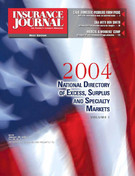Education benefits the next generation of insurance consumers.
During my 34-year tenure in the insurance industry, I cannot count the number of times I’ve heard, “Don’t they understand?” It’s often a rhetorical question, uttered during discussions among insurance professionals, and usually directed toward policyholders who inflate claims to cover deductibles, initiate litigation if they don’t financially gain from a settlement, or fail to declare a new teenage driver on their auto policy.
To those of us guided by strong moral compasses, it’s difficult to fathom that many Americans see nothing wrong with inflating the amount of an insurance claim. After all, they reason, “I’ve paid premiums all these years; I ought to get something back!” It’s the entitlement syndrome—the “you owe me” attitude—the notion that filing an insurance claim is like winning the lottery.
To gain an undeserved financial advantage at the expense of others is truly “insurance shoplifting.” Every other policyholder must contribute by paying higher premiums to make up for the difference between the valid and inflated claim. Inflating a claim is no different than reaching into someone’s pocket without asking and taking money. And while many people would not consider doing that, they don’t think twice about adding more personal belongings to the list of items lost in the burglary or seeking large punitive damage awards when there’s no bad faith.
Compound the sense of entitlement with a legal system wildly out of control and the future is bleak. Gluttonous plaintiffs rush to hungry trial attorneys; hungry trial attorneys rush to plaintiff-friendly courts. Everyone involved is looking for the financial windfall on the backs of honest, hard-working policyholders.
But instead of whining, it’s imperative that we stop this trend. Many who suffer from the entitlement syndrome simply lack a basic understanding of the economic engine that drives our country. A recent survey conducted by Integras Insurance Audit bolsters the argument that even though most people purchase insurance, they don’t see the value of learning more about insurance and financial management.
Several organizations have concluded it’s difficult to change already established attitudes about insurance, so we must seek to influence the younger generation and teach them from the “ground up.”
In 1998, the insurance industry established the Insurance Education Foundation (IEF) to “teach the teacher.” Instead of starting with the public, the Foundation started with a generation. The Foundation created programs for high school teachers and university teachers, presented annually at various universities, to teach insurance principles and the philosophy of risk management.
To arm the teachers, the Foundation created teaching kits to help educate students about risk management and being a wise insurance consumer. The results from the pilot program were encouraging—the understanding of risk management increased and students felt more equipped to make wise insurance decisions.
Another successful venture is Jump$tart, a foundation created by the financial services industry to teach young people sound and prudent financial planning and management. Jump$tart has a network of state affiliates that are helping integrate its teaching materials into the classrooms around the country.
InVEST was started in 1970 at Hollywood High School by the Independent Insurance Agents of Los Angeles to begin training students in insurance agency and company operations and encouraging them to pursue careers in the industry. It now operates nationwide and has liaisons from the insurance industry who provide teachers and students with insight, opportunities, internships, encouragement and a glimpse into the real-world of the insurance industry.
There are several state-based organizations working to accomplish many of these same goals. The Ohio Insurance Institute collaborates with Wright State University to conduct an online education program for teachers. Foundations have been formed in Kansas, Missouri, California, Michigan, and other states to provide informational material to schools and consumers focused on educating them about insurance and risk management.
As an industry, our challenge is now to expand these initiatives. It is imperative that the business community take the lead in supplementing the overwhelmed and under-funded educational system with specific information and financial resources. The business community is positioned to provide specific educational resources that can be incorporated into the teaching curriculums and provide a return that not only will benefit the insurance industry, but have a positive impact on our next generation of young consumers.
There can be no greater legacy for the business community than one of responding to the needs of our young people. It is a responsibility that we gladly accept as it will not only produce a more informed consumer but give each “young consumer” a moral compass to follow that will benefit them in all areas of their lives. We can make a difference where it counts—with the next generation.
Larry Forrester helped form the Insurance Education Foundation in 1988 and currently serves as the president and CEO. He has devoted his entire 34-year career to the insurance industry, and most recently
retired as the president of the National Association of Mutual Insurance Companies (NAMIC) in 2003.
Topics Training Development Market
Was this article valuable?
Here are more articles you may enjoy.


 Chubb CEO Greenberg on Personal Insurance Affordability and Data Centers
Chubb CEO Greenberg on Personal Insurance Affordability and Data Centers  Insurance Broker Stocks Sink as AI App Sparks Disruption Fears
Insurance Broker Stocks Sink as AI App Sparks Disruption Fears  What Analysts Are Saying About the 2026 P/C Insurance Market
What Analysts Are Saying About the 2026 P/C Insurance Market  Allstate CEO Wilson Takes on Affordability Issue During Earnings Call
Allstate CEO Wilson Takes on Affordability Issue During Earnings Call 


